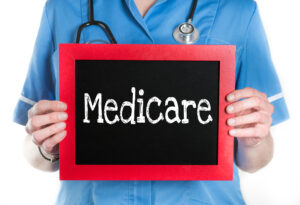
Issue #33: January 2025
Newsletter issues will tell you about Kepro’s free services for people who have Medicare. They also contain important information from Medicare and other health-related tips.
Do you receive email reminders when new issues of On the Healthcare Front are published? If not, please sign up. It's free.
Don't Keep This A Secret
Share this newsletter with friends who have Medicare by sharing this link: www.acentraqio.com/ohf/January2025
With A New Year Comes Changes In Medicare

Learn about important changes to Medicare coming in 2025.
Learn about important changes to Medicare coming in 2025.
As we head into 2025, some important changes are coming to Medicare that could impact your health coverage and costs. Whether you’re already enrolled in Medicare or planning to join soon, it’s important to stay informed so you can make the best decisions for your health care.
This article from AARP will break down the key updates, explain how they might affect you, and help you navigate the changes with confidence.
Let’s take a closer look at what’s new for Medicare in 2025.
Read this article from AARP: 7 Medicare Changes You’ll See in 2025
More Information
The Medicare & You handbook, your official guide to Medicare, is updated and mailed to all Medicare households in late September. You can download a copy at any time or access it electronically for the most updated information. You can get the handbook in many formats and languages, including large print, Braille, and more.
Medicare Open Enrollment Has Ended. What's Next?
Please read this important information from Medicare.
If you made changes during the Medicare Open Enrollment Period, you should get new plan materials in the mail.
If plan costs or benefits for existing coverage have changed, those changes will be effective on January 1, 2025.
If a service or prescription is needed after the New Year and you haven’t gotten plan membership materials yet, take the following items to the pharmacy:
- Red, white, and blue Medicare card
- Photo ID
- Acknowledgement or confirmation letter or an enrollment confirmation number from the plan
- Medicaid card or letter showing eligibility for Extra Help
If enrollment can’t be confirmed at the pharmacy, paying out of pocket for drugs and working with the plan for reimbursement is an option.
Call 1-800-MEDICARE (1-800-633-4227) with questions about your plan, benefits, claims, and more. If you prefer local support, you can call your State Health Insurance Assistance Program (SHIP) for free Medicare counseling and guidance.
If you have a Medicare Advantage plan, call your plan's customer service number for questions about coverage, benefits, or claims. This number is usually found on the back of your insurance card.
Medication Safety Tips For The New Year

Taking your medications the wrong way can lead to mistakes, unpleasant side effects, or even serious health issues. Read about simple steps for taking your medications safely.
Taking medications is a big part of staying healthy for many of us. When managing a chronic condition, fighting off an infection, or just easing a headache, the right medicine can make a big difference. But taking your medications the wrong way can lead to mistakes, unpleasant side effects, or even serious health issues.
With these simple steps, you can safely take your medications and make sure they work the way they should.
Keep a medication list.
Make a list of all the medications you take, including prescriptions, over-the-counter drugs, vitamins, and supplements. Write down the name of each medicine, how much you take, and when you take it. Share this list with your doctor and pharmacist to ensure everything works well together and to avoid harmful interactions.
Carefully read the labels.
Always read the label before taking your medication. Check the name, dosage, and instructions like “Take with food” or “Avoid driving.” If you don’t understand something, ask your doctor or pharmacist for clarification.
Follow the prescribed dosage.
Taking too much or too little of your medication can be harmful. Use a pill organizer or set reminders on your phone to help you stay on schedule. Never adjust your dose or stop taking your medication without first talking to your doctor.
Properly store medications.
Keep medications in a cool, dry place away from direct sunlight. Avoid storing them in the bathroom where heat and moisture can make them less effective. Some medications need to be refrigerated. Therefore, always check the packaging or ask your pharmacist.
Be aware of side effects.
Learn about possible side effects for each medication you take. If you notice anything unusual, like a rash, dizziness, or an upset stomach, contact your doctor right away. Being informed can help you quickly react if something doesn’t seem right.
Don’t mix medications without advice.
Some medications don’t work well together and can cause harmful reactions. This includes mixing prescription drugs with over-the-counter medicines, supplements, or even certain foods. Always check with your doctor or pharmacist before adding something new to your routine.
Be careful with over-the-counter medications and herbal remedies.
If you’re taking prescription medications, use caution when adding over-the-counter drugs and herbal remedies. Some drugs, like cold medicines or herbal supplements, can poorly interact with your prescriptions. Always read the labels and talk to your doctor or pharmacist before using them.
Take your medications correctly.
How you take your medication matters. If you have trouble swallowing pills, let your doctor or pharmacist know. Some medications can be crushed or taken in liquid form, but others cannot without changing their effects. Always double-check before making any changes.
Check expiration dates.
Using expired medications can be risky because they might not work as well or they could be harmful. Regularly go through your medicine cabinet and safely dispose of expired or unused medications.
Regularly review medications.
Take time to review your medications with your doctor, especially during regular check-ups. They can help you decide if any changes or updates are needed. Make sure all your doctors know about every medication you’re taking.
Ask questions.
If you’re unsure about how to take a medication, don’t hesitate to ask your doctor or pharmacist. Whether it’s about side effects, interactions, or what to do if you miss a dose, they’re there to help.
Be honest with your healthcare providers.
Always share your medical history, allergies, and current medications with your doctor or pharmacist. This helps them prescribe the safest and most effective treatments for you.
Stick to a trusted pharmacy.
Using the same pharmacy for all your prescriptions helps your pharmacist keep track of your medications and spot any potential issues. If you order online, make sure the pharmacy is licensed and reputable.
Taking medications safely is a team effort. By staying informed, asking questions, and working closely with your healthcare providers, you can avoid mistakes and get the most benefit from your treatments.
Remember, there’s no such thing as a silly question when it comes to your health—so always speak up if you’re unsure!
More Information
Making a medication list. If you’re not sure how to create a medication list, consider using resources such as:
- MyMedications List: This resource from the Centers for Disease Control and Prevention (CDC) is a way for you to keep track of prescription and over-the-counter (OTC) medications, vitamins, supplements, and herbal products that you are currently taking.
- Agency for Healthcare Research and Quality (AHRQ) – My Medicines List: AHRQ provides a free, printable "My Medicines List" to help you keep track of all your medications, including prescriptions and over-the-counter drugs.
- Mobile apps for your phone and tablet can send reminders, track your doses, and even alert you when it’s time to refill a prescription. Some pharmacies have their own apps available for download where you can refill your medications right from your phone! Others allow you to share your medication list with caregivers or doctors. Explore the options to find one that fits your needs and helps keep you on track.
Publication No. R146810-114-1/2025. This material was prepared by Acentra Health, a Medicare Quality Improvement Organization under contract with the Centers for Medicare & Medicaid Services (CMS), an agency of the U.S. Department of Health and Human Services. The contents presented do not necessarily reflect CMS policy.
When Should You Call Acentra Health?
- If you are not ready to be discharged from the hospital.
- If your Medicare skilled services are ending too soon. Examples of skilled services include things like physical therapy and nursing services.
- If you have a concern about the quality of care you received.
- If you have a concern about your medical care that needs to be taken care of right away.
Click on the button below for the phone number for your state. These services are free for people who have Medicare.
Getting Help With Prescription Costs
 Let’s face it, the cost of medications can be overwhelming, but Medicare has options to help lighten the load.
Let’s face it, the cost of medications can be overwhelming, but Medicare has options to help lighten the load.
The Extra Help program is a great resource if you’re on a limited income. It offers assistance with premiums, deductibles, and copayments for prescription drugs.
State Pharmaceutical Assistance Programs (SPAPs) are another option, providing additional support based on where you live.
Not sure where to start? Your pharmacist or doctor can guide you, and you can always call Medicare at 1-800-MEDICARE (1-800-633-4227) for personalized advice.
Don’t be afraid to explore generic alternatives or patient assistance programs offered by drug manufacturers—every little bit helps keep your wallet and your health in check!
January Is Glaucoma Awareness Month

Learn about glaucoma. Glaucoma has no early symptoms – that’s why so many people don’t know that they have it.
There’s no cure for glaucoma, but early treatment can often stop the damage and protect your vision.
Read more from the National Eye Institute.
Order a free booklet that was written especially for those people who were recently diagnosed with glaucoma:
Watch videos from the National Eye Institute to learn more about glaucoma.
FIND VACCINES NEAR YOU
Respiratory viruses commonly cause illnesses such as flu , COVID‑19 , and RSV (Respiratory Syncytial Virus Infection), especially in the fall and winter. Talk with your doctor about the vaccines that are best for you.
Click to go to vaccines.gov to find a location near you, then call or visit their website to make an appointment.